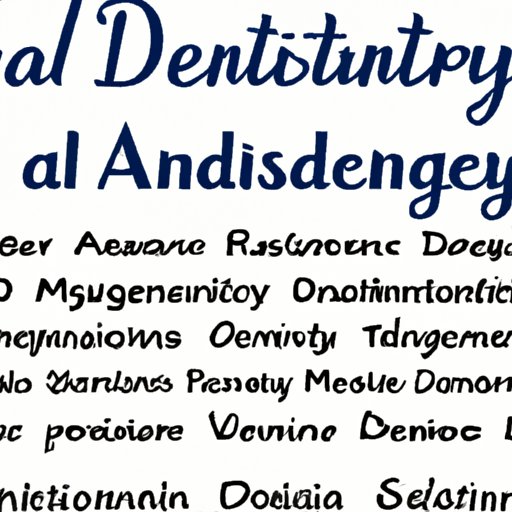
Overview of the Average Salary for Dental Assistants
Dental assistants provide support to dentists in a variety of tasks including patient care, laboratory work, and administrative duties. According to the Bureau of Labor Statistics, the median annual wage for dental assistants was $40,080 in May 2019. This means that half of all dental assistants earned more than this amount and half earned less.
The national average salary for dental assistants varies depending on many factors, such as years of experience, education, location, specialty, type of practice, and certifications. Additionally, there are regional differences in salary, with some areas paying more than others.
Factors That Affect a Dental Assistant’s Salary
Years of experience: Generally, the more experience a dental assistant has, the higher their salary will be. According to an article published by the American Dental Association, “dental assistants with one to five years of experience earn about $13.50 per hour on average, while those with six to 10 years of experience make about $15.50 per hour.”
Education: The level of education a dental assistant has can also affect their salary. Those with more advanced degrees, such as a bachelor’s degree, may be able to command higher wages. Additionally, many employers require or prefer employees with formal training from a recognized dental assistant program.
Location: Location can have a significant impact on a dental assistant’s salary. For example, according to the Bureau of Labor Statistics, dental assistants in California earn an average of $50,400 per year, while those in Texas make an average of $35,570 per year.
Specialty: Dental assistants who specialize in certain areas may be able to command higher salaries. For example, those specializing in orthodontics may be able to earn more than those who do not have this specialization.
Type of practice: The type of practice a dental assistant works in can also affect their salary. Those working in private practices may be able to earn more than those working in public health clinics. Additionally, those working in larger practices may be able to earn more than those working in smaller ones.
Certification: Some states require dental assistants to be certified in order to practice. Those who are certified may be able to earn higher salaries than those who are not.

How to Increase Your Earnings as a Dental Assistant
Pursue additional education and certifications: Dental assistants who pursue additional education or certifications may be able to increase their earning potential. For example, those who obtain additional certifications, such as radiology or nitrous oxide monitoring, may be able to command higher wages.
Obtain experience in a specialty area: Those who have experience in a specialty area, such as orthodontics or oral surgery, may be able to command higher wages. Additionally, those who have experience in multiple areas may be able to earn more than those who only have experience in one.
Negotiate with employers: Negotiating with employers can be an effective way to increase your salary. Employers may be willing to negotiate salary if they feel you are a valuable asset to their practice.

Benefits to Becoming a Dental Assistant
In addition to competitive salaries, there are many other potential benefits to becoming a dental assistant. These include flexible hours, variety of tasks, and job security. Dental assistants typically work part-time hours, allowing them to have a better work/life balance. Additionally, dental assistants perform a variety of tasks, which can make the job more interesting and enjoyable. Finally, dental assistants typically enjoy job security, as the demand for dental care is expected to remain strong in the coming years.
Dental Assistants in Different Regions and How Much They Make
Salaries for dental assistants vary by region. The following is a breakdown of how much dental assistants in different regions make, according to the Bureau of Labor Statistics:
Northeast: In May 2019, the average wage for dental assistants in the Northeast was $42,530 per year.
Midwest: In May 2019, the average wage for dental assistants in the Midwest was $38,830 per year.
South: In May 2019, the average wage for dental assistants in the South was $37,840 per year.
West: In May 2019, the average wage for dental assistants in the West was $45,270 per year.
Conclusion
In conclusion, dental assistants provide important services to dentists and patients, and can expect to earn a competitive salary. Their salaries can vary depending on many factors, such as years of experience, education, location, specialty, type of practice, and certification. Additionally, becoming a dental assistant can provide many benefits, such as flexible hours, variety of tasks, and job security. Finally, salaries for dental assistants vary by region, with higher salaries typically found in the Northeast and West.
If you are considering a career as a dental assistant, you can expect to earn a competitive salary and enjoy the many benefits that come with the job. With dedication and hard work, you can increase your earnings and find success in your chosen profession.
(Note: Is this article not meeting your expectations? Do you have knowledge or insights to share? Unlock new opportunities and expand your reach by joining our authors team. Click Registration to join us and share your expertise with our readers.)
